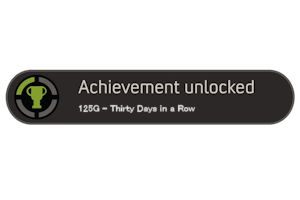4 Things You Learn Writing Every Day
 | | Not what I meant, but I'm sure whoever wrote Every Day learned plenty of valuable lessons as well |
I am a lazy person. If there is a way I can justify spending several hours doing absolutely nothing but sitting around in my underwear playing Fallout 4, I'll go through whatever mental gymnastics are required to get me there. For emphasis, let me stress that I am in my late thirties, where such behavior is downright stupid. Aside from taking care of my family, the only thing that can really get me motivated is my writing. However, even that can feel like a chore sometimes, and it's a constant struggle for me to balance my creative needs with my inherent desire to never be productive. Most writers suffer from similar problems, even the few of us who aren't incredibly lazy bastards, and from this dilemma we have an oft-repeated maxim, popularized by the incredibly prolific Stephen King: "Write Every Day."
When I was much younger, this was never even a problem for me. In high school and the first year or so of college (before I discovered the joys of pissing away finals week in a drunken haze), I wrote every day, not because I was following Mr. King's advice, but because it was a compulsion. My high school friends marveled at my prolixity and encouraged me to continue, so that I might become famous one day and they could sell some scrap of paper I once gave them for millions of dollars. What fools, believing writing is actually worth money!
As an adult, though, being prolific is a more arduous task. Days seem shorter, responsibilities are greater, and video games are both longer and more awesome than ever. On top of that, I'm less of a fly-by-the-seat-of-my-pants kind of writer (not counting this blog, where I tend to do most of my writing from the hip), preferring to plot and plan carefully, to make my fiction more intelligent, thematic, sophisticated, and semi-accurate. I've gone through spurts where I've written every day for a month or two, but I've never gotten into the consistent rhythm I need. For the last twenty-three days, I've been writing every day, and this time, I've decided to jot down a handful of the lessons I've learned, so that perhaps I can encourage other writers (and, of course, myself) to continue following the maxim.
It Stops Feeling Optional
 | | As opposed to clothing, which should always be optional |
Writing has never really been optional for me. Even at my most blocked, I knew I was a writer and that I'd get back to it eventually. It's never been a hobby (or, sadly, a career). It's more like an obsessive disorder, a mental disease I cherish and nurture whenever I can. Still, on a day-to-day basis, writing can feel like something on a to-do list that can be ignored whenever you want. Making yourself write can feel like work, which is the worst four-letter word humankind has ever birthed. This is especially true if you're working on something that has gotten a bit tricky, like if you've reached a nebulous point in a planned-out story and you aren't sure how you're supposed to get through it without resorting to tired clichés and inconsistent characters.
However, after you've written every day for a while, it starts to solidify itself into your routine. It starts being less about how you'll convince yourself to write today and more about what you'll write today. I don't have any hard and fast rule about how much I have to write every day, because once I sit down and start writing, it actually becomes difficult for me to stop. Granted, I have a pretty flexible daily schedule, so I can get away with being vague about the whens and the how longs, and I know most people don't really have that. If it helps you, though, don't hesitate to put a time stamp on it, to say something like, "On weekdays, I will write for an hour every night at 9:00, after the kids have gone to bed and early enough so that I can get some sleep and be awake for work the next day, and then on the weekends, I'll write immediately after lunch." I'm much too lazy to have a schedule that strict, though I've tried it more than once.
Your Writing Becomes More Consistent
 | | If only they practiced every day |
If you've been writing for a long time, you know that you are constantly going through gradual stylistic changes. If you're a novelist who likes to put years into a single work (like me), that can pose a significant problem, because the writer you were when you wrote the first page is not going to be the same writer who writes the last page. Meticulous editing can smooth out the wrinkles enough that your average reader won't notice, but no matter how much ironing you do, you will always notice.
The good news is that, if you write every day, those gradual changes will flow more fluidly with your work. (I'm assuming you write your novels in order from beginning to end, because if you aren't that kind of writer, I don't understand you at all and you can disregard all my advice.) For example, I've been working on my current novel since at least 2011, and I took a big hiatus two years ago to rewrite and heavily edit Paradox for publication (available now through Amazon.com; get your copy today in Kindle or paperback, and don't forget to leave a glowing review if you like it!). I had to discard almost everything I wrote before the break, because there was no way for me to jump back into it without leaving an enormous seam. I'm actually glad I did, despite the setback, because honestly, restarting it has done far more good than harm.
As for the stuff I've been writing over the last twenty-three days, it's been much more coherent and consistent than the stuttery stuff that precedes it. I have no intention of starting over again--I'm just too far along now--but I am moving forward with a lot more confidence that my style isn't jagged, that I'm not forgetting plot threads I carefully weaved at the start of the story, or that I've changed so much since the beginning that I am now unsatisfied with what I've already written.
You Realize Writer's Block is a Lame Excuse
 | | Not a good cure for writer's block |
Don't worry; I'm not going to tell you writer's block isn't a thing, because it totally is (and anyone who says otherwise is an insufferable lunatic). However, it's easy to let it become an excuse. When you write every day and force yourself to write through a difficult section or on a day where you'd rather bang your head on the keyboard than form coherent sentences, you'll find that most cases of writer's block are easy to overcome. Even the most tangled narrative conundrum can be solved if you push through, and even if you gloss over something problematic, there's no law that says you can't come back to that section at a later date and fix it.
On top of that, when you write every day, it means you're thinking about your work every day, and that lends itself to quicker problem-solving. Once you get to the point that you're dreaming about your work, you'll even have your subconscious working on it, so be sure to thank it when you have your next eureka moment. Eventually, you'll learn the lesson that there is only one surefire cure to writer's block: writing. I know that can be a frustrating Catch-22, but trust me when I tell you it can be done.
Keeping Track of the Days Tricks the OCD
 | | This would definitely motivate me |
I don't really have an obsessive compulsive disorder (or even an obsessive compulsive personality disorder, which is, yes, a separate thing), but OCD is a convenient shorthand for the eccentricity all writers share. If your OCD is like mine, you'll find the draw of an unbreakable streak hard to resist. Like an alcoholic clinging to sobriety for a few more days to get that coveted one year chip at the next meeting, if you announce to the world that you're on Day 23 of daily writing, you won't want to disappoint yourself (or the whole world) by making tomorrow Day 1 again.
So yeah, did I mention today is Day 23 for me?
-e. magill 5/11/2016
|
|